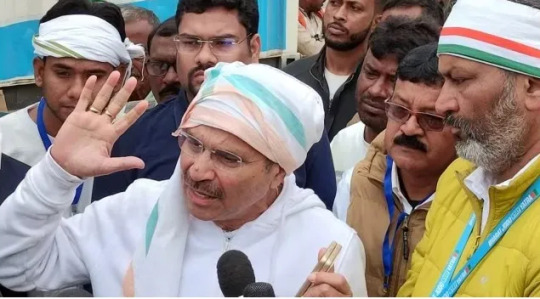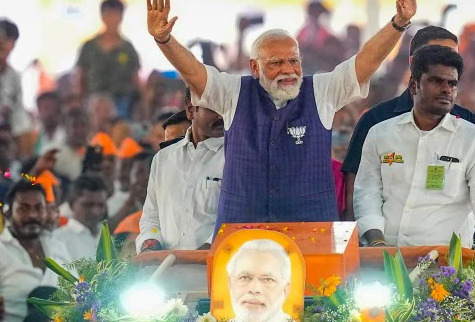Text
Congress’s Adhir Ranjan Chowdhury, who was also stopped, pointed out that it was a public road.
Congress’s Adhir Ranjan Chowdhury, who was also stopped, pointed out that it was a public road.
Political Controversy Erupts as Police Block Visits to Sandeshkhali: Congress and BJP Delegations Stopped
The political atmosphere in West Bengal has become charged following the police’s obstruction of visits to Sandeshkhali by both Congress and BJP delegations. The BJP’s planned visit saw a diversion to the West Bengal Raj Bhavan, while Congress’s Adhir Ranjan Chowdhury staged a protest where he was halted.

The actions of the police drew sharp criticism from both parties, with accusations of unconstitutional and unethical behavior directed towards West Bengal Chief Minister Mamata Banerjee.
The six-member BJP delegation, including Union Ministers Annapurna Devi and Pratima Bhowmick, was halted merely five kilometers from Sandeshkhali, at Rampur. Similarly, the Congress team, led by Adhir Ranjan Chowdhury, faced obstacles at Sarberia and Rampur. The parties condemned these actions in unison.
The unrest in Sandeshkhali has led to the imposition of prohibitory orders under CrPC Section 144, following violent protests by local villagers. Allegations against local Trinamool Congress (TMC) leader Shahjahan Sheikh and associates include land grabbing, sexual harassment, and assault on local laborers.
Reports indicate that the BJP leaders were stopped by the police upon reaching Rampur, where they alleged mistreatment and were compelled to stage a dharna for hours. Annapurna Devi expressed dismay, highlighting the contradiction of allowing criminals freedom while impeding elected representatives from addressing citizens’ concerns.
BJP MLA Agnimitra Paul emphasized their attempts to comply with regulations, only to be met with persistent obstruction. Despite this, the delegation managed to connect with women in Sandeshkhali via video call before redirecting their efforts to the Raj Bhawan in Kolkata to meet Governor C V Ananda Bose.
Meanwhile, Congress MP Adhir Ranjan Chowdhury’s protest in Rampur underscored his questioning of the legitimacy of police barricades on public roads. He dismissed Chief Minister Mamata Banerjee’s allegations linking the BJP and RSS to instigating trouble in Sandeshkhali, condemning what he deemed divisive politics.
In contrast, TMC MP Shantanu Sen defended the police’s actions, questioning the BJP’s motives and citing their alleged lack of proactiveness in previous incidents. Sen echoed the sentiment that allowing the BJP delegation entry could destabilize the state’s atmosphere.
0 notes
Text
Unveiling Kerala’s Political Cauldron: The Intrigue Behind a CPM Leader’s Family Deal with Rajeev Chandrasekhar’s Firm
In the vibrant political landscape of Kerala, where alliances are forged and rivalries run deep, recent events have thrust an intriguing business deal into the spotlight. At the heart of this controversy lies a prominent CPM leader’s family and their connection with a venture backed by Union Minister Rajeev Chandrasekhar.

The catalyst for this uproar came from an unexpected source — E P Jayarajan, a central committee member of the CPI(M) and the convener of the ruling Left Democratic Front (LDF). During a press interaction in Kannur, Jayarajan made headlines by offering unexpected praise for the BJP’s choice of candidates in the upcoming elections. His remarks, highlighting the strength of BJP candidates in various constituencies, raised eyebrows in a state where the Left and the Congress-led United Democratic Front (UDF) are the dominant political forces.
However, what added fuel to the fire was the revelation regarding a business transaction involving Jayarajan’s family and a hospitality venture associated with Rajeev Chandrasekhar. It was disclosed that Jayarajan’s wife and son own shares in an Ayurvedic spa center in Kannur, which transferred its operations to a hospitality venture backed by Chandrasekhar’s private equity firm last year. This development prompted the Congress to question the Left’s commitment to combating the BJP, especially considering the ideological gulf between the two parties.
As accusations and counter-accusations flew between political rivals, the Chief Minister Pinarayi Vijayan and CPI(M) state secretary M V Govindan sought to downplay the significance of Jayarajan’s remarks, emphasizing that the primary political contest in Kerala remains between the CPI(M) and the Congress.
Delving deeper into the intricacies of the deal, it becomes apparent that the ties between Jayarajan’s family and Chandrasekhar’s firm are not merely business transactions but have drawn scrutiny from investigative agencies. Allegations have been made suggesting a quid pro quo, with claims that the probe by enforcement agencies into the Ayurvedic spa ceased following the transfer of operations to Chandrasekhar’s venture.
The controversy escalated further when V D Satheesan, the Leader of Opposition from the Congress, accused the CPI(M) of colluding with the BJP, labeling their relationship as a “mutual co-operative movement.” In response, Jayarajan refuted the allegations, accusing Satheesan of various misdeeds and prompting a legal exchange between the two parties.
This is not the first time the Vaidekam-Niraamaya Retreats deal has faced scrutiny. Previously, Jayarajan’s financial dealings had come under question, leading to internal debates within the CPI(M). While the issue seemed to fade away temporarily, it resurfaced with renewed vigor following the involvement of central agencies.
Amidst these controversies, what remains to be seen is the impact on Kerala’s political landscape. As parties trade accusations and engage in legal battles, the electorate watches closely, seeking transparency and accountability from their leaders.
In the end, this saga serves as a reminder of the intricate interplay between politics and business, where deals are scrutinized not just for their financial implications but also for their potential impact on the democratic process. As Kerala gears up for elections, the spotlight on this contentious affair underscores the high stakes involved in the pursuit of power.
0 notes
Text
Zomato’s Shares Soar as ‘Pure Veg Fleet’ Plans Get Scrapped
In a recent turn of events, Zomato, the popular online food delivery platform, witnessed a significant uptick in its shares, surging by 3% to reach Rs 170. This surge comes hot on the heels of the company’s decision to abandon its plans for a ‘pure veg fleet’ as part of its upcoming ‘pure veg mode,’ aimed at catering to the preferences of Indian vegetarian customers.

Investors responded positively to this development, with Zomato shares gaining 4.35 points, marking a 2.63% increase on Thursday (March 21), reaching Rs 169.90 per share on the NSE. Notably, several brokerage firms have maintained a ‘buy’ rating on Zomato, with UBS setting a target price of ₹195 per share, citing expectations of sustained year-on-year growth for the company.
CEO and co-founder Deepinder Goyal explained the decision to backtrack on the ‘pure veg fleet’ initiative, stating concerns about potential landlord issues faced by some customers due to the segregation of delivery partners. Despite earlier claims of an “overwhelmingly positive” response to the segregated fleet proposal, the company prioritized customer welfare in this instance.
However, criticism has emerged following this decision. Sheikh Salauddin, President of the Indian Federation of App-Based Transport Workers (IFAT), questioned Goyal’s stance, pointing to previous statements emphasizing that “food has no religion.” The move sparked concerns about potential categorization of delivery partners based on factors like caste, community, or religion.
This isn’t the first time Zomato has found itself embroiled in controversy. Last year, the company issued an apology for an advertisement featuring a Dalit character from the film Lagaan, raising accusations of insensitivity and exploitation. The advertisement prompted the National Commission for Scheduled Castes (NCSC) to issue a notice, highlighting the importance of responsible advertising practices.
As Zomato navigates through these challenges, its recent share rally reflects the dynamic landscape of the food delivery industry and the company’s ongoing efforts to balance innovation with sensitivity to customer preferences and societal concerns.
0 notes
Text
Reflecting on Sarbjit: Randeep Hooda’s Bond Beyond the Screen
In a candid reflection on his time filming Sarbjit, actor Randeep Hooda shares insights into his experience working alongside Aishwarya Rai Bachchan and the profound connection he forged with Sarabjit Singh’s family.

Directed by Omung Kumar, Sarbjit delves into the poignant tale of Sarabjit Singh, a man embroiled in the tumultuous realms of terrorism and espionage in Pakistan. Hooda recalls Rai’s presence on set as sincere, despite the challenge of transforming her appearance to mirror reality. “They tried their best to make her look real, but she’s so unreal,” he quips with a smile.
While acknowledging Rai’s professionalism, Hooda highlights a deeper bond formed with Sarabjit’s family, particularly his sister portrayed by Aishwarya in the film. Reflecting on his interactions, he shares, “Although we didn’t have many interactions on set because a lot of my scenes were away from her, but whenever we did, she was all that she’s made out to be.”
However, it was the profound connection with Sarabjit’s family that left an indelible mark on Hooda. He recounts the emotional moment of fulfilling Sarabjit’s sister’s final wish by lighting her funeral pyre, a gesture that symbolized the depth of their bond. “That movie had a real-life impact,” he muses, emphasizing the lasting resonance of the project.
As Hooda gears up for his directorial debut with the controversial biopic Swatantrya Veer Savarkar, his journey in Sarbjit serves as a poignant reminder of the profound human connections that transcend the boundaries of cinema.
0 notes
Text
Modi’s Southern Sojourn: A Strategic Push with Artificial Intelligence
In a whirlwind series of visits spanning the past 10 days, Prime Minister Narendra Modi has orchestrated an unprecedented outreach to the five southern states of India. From bustling roadshows to solemn inaugurations, Modi’s presence has been felt both physically and virtually, unveiling development projects worth over Rs 6,000 crore. The timing couldn’t be more critical as the BJP and the NDA gear up for the upcoming Lok Sabha elections with ambitious targets in mind.

Over the course of his journey, Modi has crisscrossed Tamil Nadu, Kerala, Karnataka, Andhra Pradesh, and Telangana multiple times. Each stop strategically chosen, each event meticulously planned. Just recently, he graced Palakkad in Kerala and addressed a rally in Salem, Tamil Nadu. His schedule doesn’t relent, as he moves from public meetings in Telangana to Karnataka, culminating in a stirring roadshow in Coimbatore, Tamil Nadu.
The BJP’s stronghold in the South has historically been confined to Karnataka, but Modi’s relentless efforts signal a shift in dynamics. The party’s aspirations soar high, aiming to secure a substantial foothold in the region. Prakash Javadekar, Kerala in-charge for the BJP, exudes confidence, predicting the party’s emergence as the single largest force in South India.
But Modi’s strategy extends beyond mere physical presence. Leveraging technology like machine learning, the BJP is bridging linguistic gaps by translating the PM’s speeches into local languages. This strategic move ensures that Modi’s message resonates deeply with diverse audiences across the region.
Even before the Model Code of Conduct took effect, Modi was on a spree, virtually inaugurating projects and laying foundations, seamlessly connecting with the South from various corners of India. Whether it’s launching Vande Bharat trains or unveiling highway projects, Modi’s vision for Southern development knows no bounds.
Noteworthy is Modi’s “gifting spree” in February, where he inaugurated a plethora of projects ranging from educational institutions to infrastructure upgrades. The gesture was not just symbolic; it was a testament to the government’s commitment to Southern progress.
Moreover, the announcement of Bharat Ratna for the late M S Swaminathan, a revered agricultural scientist from Tamil Nadu, underscores the government’s recognition of Southern contributions to the nation’s growth.
In Modi’s Southern sojourn, every move is calculated, every step forward meticulously planned. As the landscape of Indian politics undergoes a transformation, Modi’s strategic push backed by artificial intelligence underscores a commitment to inclusivity and progress for all corners of the nation.
0 notes
Text
Captain Gopinath: Pioneer of Affordable Air Travel
Early Life and Military Service
Gorur Ramaswami Iyengar Gopinath, known as Captain Gopinath, was born on November 13, 1951, in Gorur, a small village in Karnataka. His father, a teacher and farmer, instilled in him values of diligence and ambition. Gopinath’s journey to prominence began with his admission to Sainik School, Bijapur, followed by the National Defence Academy (NDA) and the Indian Military Academy (IMA).

After serving in the Indian Army until the Bangladesh War of 1971–72, Gopinath retired at the age of 28, driven by a desire for entrepreneurial ventures beyond military life. His subsequent pursuits in silk farming, dairy farming, and hospitality laid the groundwork for his transformative career in aviation.
Venturing into Aviation: From Helicopters to Airlines
In 1997, Gopinath ventured into aviation with Deccan Aviation, offering chartered helicopter services. Recognizing the untapped potential for affordable air travel, he conceived the idea of establishing a low-cost airline during a trip to America in 2000. Witnessing the efficiency of Phoenix Airport, Gopinath resolved to make air travel accessible to the common Indian.
Air Deccan: Revolutionizing Air Travel
In August 2003, Gopinath launched Air Deccan, India’s first low-cost airline, with a fleet of six aircraft. Inspired by European budget carriers, Air Deccan aimed to democratize air travel by offering affordable fares to the masses. By 2007, it operated 380 flights daily from 67 airports, catering to a growing number of passengers at accessible prices.
Innovative Pricing Model: Flying for Re 1
Air Deccan made headlines by introducing dynamic pricing, enabling passengers to fly for as little as Re 1. This groundbreaking initiative, coupled with a no-frills service model, revolutionized the aviation industry and made air travel accessible to millions of Indians.
Mergers and Challenges
Despite its initial success, Air Deccan faced financial challenges and underwent restructuring, culminating in its merger with Kingfisher Airlines in 2008. Despite Gopinath’s vision, subsequent developments in the aviation sector led to the closure of Kingfisher Red in 2011, marking the end of an era in Indian aviation.
Legacy and Impact
Captain Gopinath’s pioneering efforts transformed the Indian aviation landscape, making air travel affordable and accessible to millions. His entrepreneurial spirit and visionary leadership continue to inspire future generations, underscoring the power of innovation and perseverance in realizing ambitious dreams.
Conclusion
Captain Gopinath’s journey from a humble village to the forefront of Indian aviation epitomizes the spirit of enterprise and resilience. His legacy as the architect of affordable air travel resonates as a testament to the transformative potential of bold ideas and unwavering determination in shaping industries and empowering communities.
0 notes
Text
“Wanindu Hasaranga Suspended by ICC: Sri Lankan Leg-Spinner’s Comeback Delayed”
Sri Lankan cricket fans were anticipating the return of Wanindu Hasaranga to the international Test arena, but unfortunately, his comeback moment will have to wait. The 26-year-old leg-spinner, who recently unretired from Tests, has been suspended by the International Cricket Council (ICC), casting a shadow over his immediate future in the sport.

Hasaranga found himself in hot water after breaching the ICC Code of Conduct during the third ODI against Bangladesh. His act of dissent towards the umpire in the 37th over of the match led to his suspension. The ICC, in a statement on their website, described his actions as “ridiculed” the umpiring.
As a consequence of his breach, Hasaranga has been fined 50 percent of his match fee and received five demerit points. This breach, coupled with previous demerit points accrued during a match against Afghanistan last month, has resulted in his suspension from international cricket.
With this latest offense, Hasaranga has crossed the threshold of eight demerit points, leading to a suspension from four matches. This ban could have significant implications, potentially causing him to miss crucial fixtures, including the T20 World Cup 2024.
Meanwhile, the ICC also reprimanded Sri Lankan captain Kusal Mendis, imposing a 50 percent match fee fine and three demerit points for misconduct towards the umpires.
Amidst the suspension, there is a glimmer of hope for Hasaranga’s fans, as he may make an appearance for Sunrisers Hyderabad (SRH) in the Indian Premier League (IPL). Initially unavailable for a few matches, Hasaranga could now join SRH, offering his talents to the franchise as they embark on their IPL campaign.
As cricket enthusiasts await further developments, Hasaranga’s suspension serves as a reminder of the importance of maintaining discipline on and off the field. While setbacks are inevitable, it is essential for players to learn from their mistakes and strive for improvement in the pursuit of sporting excellence.
0 notes
Text
Standing Together: Supporting Actress Arundhati Nair Through Tough Times
In a heart-wrenching turn of events, beloved actress Arundhati Nair, renowned for her role in the hit movie “Shaitaan,” finds herself battling for her life after a tragic road accident. The news has shaken her fans and colleagues alike, prompting an outpouring of support and prayers.

Just four days ago, tragedy struck when Arundhati was involved in a bike accident along the Kovalam bypass in Thiruvananthapuram, leaving her with severe injuries, including head trauma. Traveling with her brother at the time, the accident has left her family reeling, grappling not only with the emotional turmoil but also the financial strain of medical expenses.
In the wake of this unfortunate incident, Arundhati’s family has bravely turned to social media, seeking assistance to alleviate the burden of medical costs. However, amidst their plea for help, they’ve encountered an overwhelming influx of inquiries and messages, exacerbating an already challenging situation.
Colleague and friend, Remyaa Joseph, took to Instagram to address the issue, urging the public to refrain from bombarding the family with queries and instead respect their privacy during this trying time. “Please stop calling the G-Pay number given on the fundraising page, asking for more details about actor Arundhati Nair,” Joseph pleaded in a heartfelt plea.
Arundhati’s sister, Arathy Nair, provided a poignant update on her sister’s condition, confirming the severity of her injuries. “She’s fighting for her life while being kept on a ventilator at Ananthapuri Hospital in Trivandrum,” Arathy shared, shedding light on the grim reality of the situation.
Further details emerged through Joseph’s Instagram reel, revealing the extent of Arundhati’s injuries, from broken ribs to a fractured neck bone and internal bleeding. Despite the gravity of the situation, the family found themselves facing unnecessary criticism and trolling when they initiated a fundraising campaign to cover medical expenses.
In the face of adversity, Arundhati’s family and friends continue to rally around her, determined to provide the support she needs to pull through this ordeal. However, amidst their tireless efforts, they’ve been met with unwarranted intrusions and demands for information, exacerbating their distress.
As Joseph eloquently expressed, “We are going through more than what people are thinking,” highlighting the immense emotional strain and anguish they’re enduring. Amidst the chaos, a fundraising page was established to channel support for Arundhati’s medical treatment, yet it was regrettably taken down from social media platforms.
In times of adversity, it’s imperative that we come together as a community to offer our unwavering support and compassion. Let us stand united in solidarity with Arundhati Nair and her family, providing them with the strength and resources they need to navigate through this challenging chapter. Together, we can make a difference and help light the path towards recovery for this beloved actress.
0 notes
Text
Supreme Court Invalidates Electoral Bonds: Countering Arun Jaitley’s Arguments
In a landmark decision, a five-judge constitution bench of the Supreme Court has declared the electoral bonds scheme unconstitutional, citing its violation of the Right to Information Act and thereby impinging on the Fundamental Right to Freedom of Speech and Expression under Article 19(1)(a) of the Constitution.

Former Finance Minister Arun Jaitley had introduced the Electoral Bonds Scheme on January 2, 2018, in the Lok Sabha, emphasizing its potential to mitigate the influx of black money into political party funding. However, the scheme faced judicial scrutiny, culminating in its recent nullification by the apex court.
Key Points from the Supreme Court Verdict:
The court asserted that transparency regarding political party funding is indispensable, highlighting that the electoral bonds scheme undermines the right to information.
Chief Justice of India D Y Chandrachud elaborated on the inherent quid pro quo between political funding and policy-making, deeming the lack of disclosure regarding corporate funding as unconstitutional.
Contrary to the government’s argument of curbing black money, the court held that the objective doesn’t justify compromising fundamental rights. It applied a three-pronged test, as outlined in the 2017 Justice K S Puttaswamy (retd) v Union of India ruling, emphasizing that the electoral bond scheme wasn’t the least restrictive method available.
The court invalidated amendments to the Income Tax Act and Section 29C of the Representation of the People Act.
Arguments Presented by Arun Jaitley:
In defense of the electoral bonds scheme, Jaitley contended that disclosing individual donor contributions would discourage donations, potentially reverting to less desirable cash-based donations. He argued that the scheme represented a significant improvement in transparency compared to the existing opaque funding system. Jaitley highlighted the prevailing non-transparent political funding ecosystem and emphasized the need for reform. He outlined the features of the electoral bonds scheme, emphasizing its transparency through banking instruments and mandatory disclosure requirements for both donors and political parties.
A recent Supreme Court ruling has invalidated the electoral bonds scheme, a brainchild of former Finance Minister Arun Jaitley, citing its infringement upon the Right to Information Act and fundamental rights enshrined in the Constitution. Introduced in 2018 as a measure to tackle black money in political funding, the scheme faced constitutional scrutiny, culminating in its annulment by the apex court.
The court’s decision underscored the imperative of transparency in political funding, rebuffing the government’s argument of curbing black money through the electoral bonds scheme. Chief Justice D Y Chandrachud elucidated the symbiotic relationship between political funding and policymaking, deeming the lack of disclosure regarding corporate funding unconstitutional. Additionally, the court applied a rigorous test, concluding that the scheme failed to meet the standards of least restriction on fundamental rights.
Jaitley, in defense of the electoral bonds scheme, argued that mandatory disclosure of donor contributions could dissuade donations, potentially reverting to less desirable cash-based transactions. He emphasized the scheme’s role in enhancing transparency compared to the existing opaque funding practices.
In essence, the Supreme Court’s verdict not only nullifies the electoral bonds scheme but also underscores the significance of transparency and accountability in political funding, setting a significant precedent for future electoral reforms.
0 notes
Text
Supreme Court Strikes Down Electoral Bonds Scheme as Unconstitutional: A Blow to Anonymous Political Funding
In a significant verdict delivered recently, the Supreme Court of India declared the electoral bonds scheme as “unconstitutional.” This ruling marks a watershed moment in the country’s electoral landscape, with far-reaching implications for political funding and transparency.

A unanimous decision by a five-judge Constitution bench, led by Chief Justice DY Chandrachud, held that the anonymous nature of the electoral bonds scheme violates the fundamental right to information enshrined in Article 19(1)(a) of the Indian Constitution. The verdict comes after a series of legal challenges to the central government’s scheme, which allowed for undisclosed funding to political parties.
The court emphasized the critical role of political parties in the electoral process and underscored the importance of transparency in funding for making informed electoral choices. Consequently, the Supreme Court directed the State Bank of India (SBI) to cease issuing any further electoral bonds, signaling an end to the controversial system.
The ruling is a setback for the Bharatiya Janata Party (BJP), which has been the primary beneficiary of the electoral bond scheme since its introduction in 2017. Additionally, the court mandated the SBI to furnish details of electoral bonds purchased from April 12, 2019, onwards to the Election Commission, further enhancing transparency in political funding.
Advocate Prashant Bhushan hailed the verdict as a significant step towards safeguarding electoral democracy, emphasizing that it upholds citizens’ right to information regarding political contributions. The court’s decision nullifies the provisions introduced in various laws, including the Income Tax Act and the Companies Act, pertaining to the implementation of the electoral bonds scheme.
Initially pitched as an alternative to cash donations, the electoral bonds scheme allowed individuals and entities incorporated in India to purchase bonds, which could then be donated to eligible political parties. However, only parties meeting specific criteria, such as securing at least 1% of votes in previous elections, were eligible to receive these bonds.
Despite initial legal challenges, the apex court had declined to stay the scheme in April 2019, opting instead to delve deeper into the issues raised by the Centre and the Election Commission. The Constitution bench, during hearings, stressed the need to reduce the reliance on cash in the electoral process, highlighting the broader implications for the sanctity of elections in the country.
The verdict represents a significant victory for transparency and accountability in political funding. It underscores the judiciary’s role in upholding democratic principles and ensuring that electoral processes remain fair and equitable. With the electoral bonds scheme now deemed unconstitutional, the focus shifts towards exploring alternative mechanisms that promote transparency and public trust in India’s democratic institutions.
1 note
·
View note